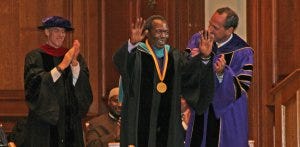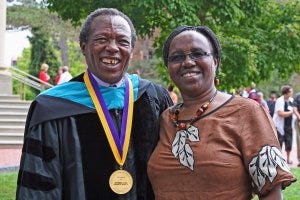By Professor Ken Kuttner — September 7, 2012

It is a pleasure to have the opportunity to introduce Charles Waigi, class of 1972, one of the recipients of this year’s bicentennial medal. The story of Charles’ life, and his accomplishments, is pretty incredible, and it’s hard to do justice to it in just a few minutes.
Let’s begin at the beginning. Charles grew up rural Kenya, in a place called Kiharo (which I am told means “open field”), the son of a flower farmer. Apparently, much of his idyllic early childhood was spent herding goats, and sliding down hills that had been generously lubricated with cow dung. (Dung from purple cows, one hopes.)
When he reached school age, Charles had the good fortune to enter the Rironi Primary School. The school had high academic standards and tough discipline: mistakes on homework were punishable by caning! (Perhaps this is a policy we should think about instituting here, Adam.) But despite the rigors, or perhaps because of them, Charles recalls these years in primary school as being the most important period in his life, as they gave him the discipline and work ethic that has made him so successful.
While a sophomore in high school, he entered and won an essay competition sponsored by the New York Herald Tribune. The prize was to come to New York for three months, and participate in something called the World Youth Forum. Charles credits this experience with changing the course of his life — firing his interest in the world beyond Kenya’s borders. Charles finished out his high school years as an exchange student at Lincoln-Sudbury High School, in the Boston suburbs.
Charles’ hard work in high school paid off, as it allowed him to attend Williams, thanks to a Garfield Scholarship. His classmates describe Charles — they all call him Charlie — as the friendliest, most engaging person they knew. He must have been a unique character on campus — this at a time when there were very few foreign students, and none others from Africa. And even without the threat of caning, he graduated with honors, and earned the Graves Prize in Political Science.
After receiving a master’s degree from the Woodrow Wilson School, Charles went on to a distinguished career in public service. His professional achievements are far too numerous to mention, but they include stints in the Foreign Ministry, the Central Bank of Kenya, and the Industrial and Commercial Development Corporation. He has served, or is currently serving, on the boards of a number of schools in and around his home town of Limuru. I should also mention that Charles serves as the “village elder” for his community.
But his proudest accomplishment — and the one we recognize in awarding Charles the bicentennial medal — is his involvement with the Jeremy Academy, a primary school he co-founded with his wife Teresia after their retirement.
The Academy began in 1999 with nine students. Today, there are 469 in grades K through 8. But what distinguishes the school is the quality of its instruction, not the quantity of students. The Academy is consistently ranked as among the best primary schools in the country, and in recent years all of its graduates have gone on to high school. This in a country where only 10% of primary school graduates obtain any secondary education. Remarkably, the school also accommodates students with special needs, which I understand is almost unheard of in East Africa.
This is where the story circles back to Williams. While Charles was pursuing his career in public service and founding the Jeremy Academy, he had totally dropped off of the radar screen — nobody knew what he was up to, not even the alumni office. But thanks to the persistence of his Williams comrades (some of whom are here with us this evening), Charles was “found” in time for his 35th reunion in 2007. Since then, Williams alumni have been active supporters of the school. Working with the Asante Africa Foundation, they have made possible a major expansion of the school, and a purple cow flag flies on the school flagpole.
As should be evident by now, Charles’ vision, his passion, is to harness the power of education to make his country a better place. One motivation is pivotal role of education in economic growth: countless economic studies have found that the level of primary education is one of the best predictors of a country’s prosperity. Moreover, as you can hear Charles explain in his YouTube video, education is critically important for the creation of a civil society.

Having grown up with easy access to good schools, a quality education is probably something most of us take for granted. I know that walking the short distance from my home to a very good public high school, I never gave the matter a second thought. Charles’ story is a vivid reminder that the educational opportunities we enjoy are still very much a luxury for the majority of kids in East Africa. For bringing the gift of education to the children of Kenya, Charles — and Teresia — deserve our highest accolade.
